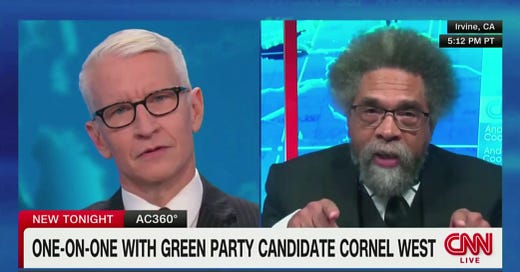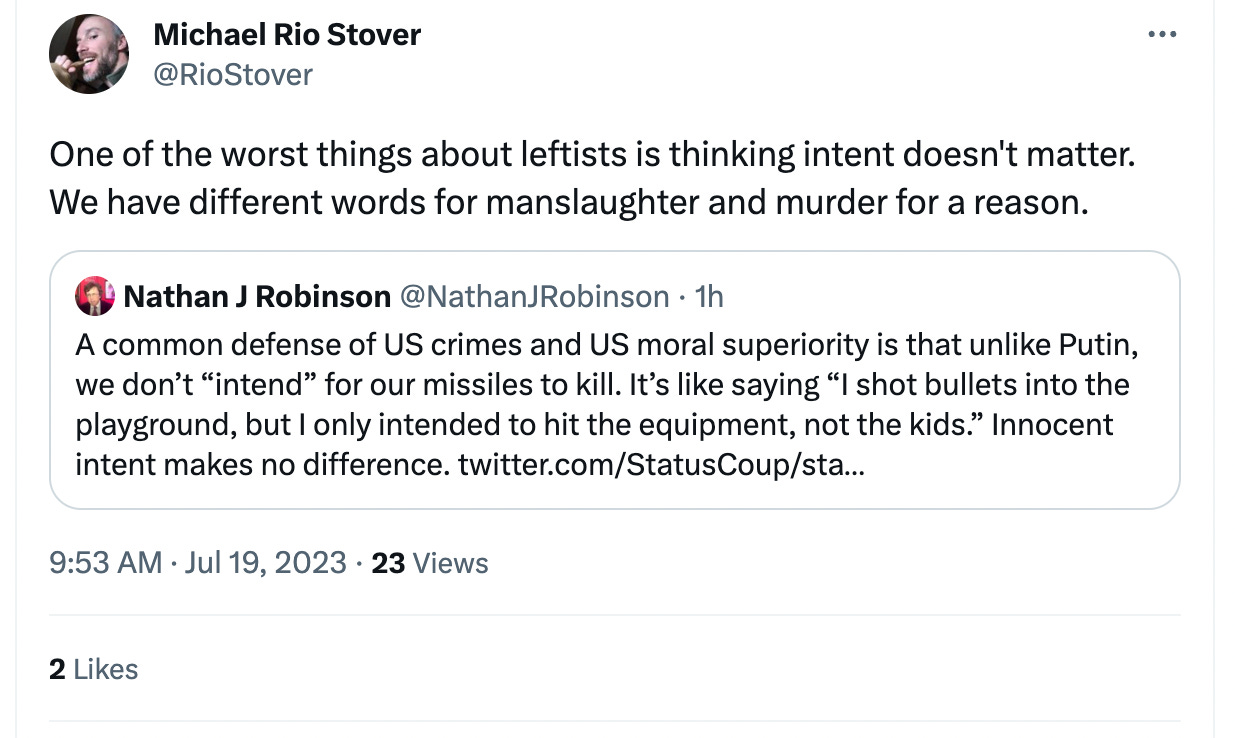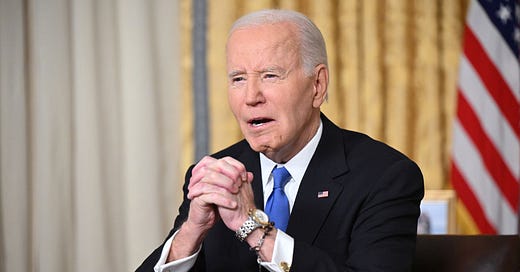
Anderson Cooper’s Feigned Indignation at the Idea the U.S. Commits War Crimes Shows Primary Ideological Function of U.S. Media
An object lesson in tedious gatekeeping and fake outrage.
As I’ve written here and elsewhere, affirming and reinforcing the premise that the US and its allies must exist in a sacred moral category separate from other major global powers is a key function of the US media. Our media can criticize here and there around the margins, but it must ultimately prop up the civic religion and its essential dogma that the US has noble and humanitarian intentions, whatever this means. A good example of this essential role happened a few days ago on CNN, when Green Party presidential candidate Cornel West was on CNN’s Anderson Cooper 360 discussing Russia and US war crimes.
Without commenting on the other claims West made in the interview (or the wisdom of his campaign), his claim that, in recent memory, the US has committed war crimes comparable to those committed by Russia during the Battle of Grozny is profoundly uncontroversial and self-evident. But Cooper wouldn’t hear any of it, insisting that “it’s inappropriate to compare the Russian bombing of Grozny, and what we witnessed there, to the War in Iraq…I don’t think it’s accurate to compare the pummeling of a city with Russian artillery with civilians inside, with the intention of destroying and flattening a city with actions the US took [in Iraq]”
Begin watching around the 5:00 mark.
Intent here is a rather squishy concept and one that, in this context, is transparently self-serving and impossible to falsify.
After Current Affairs’ Nate Robinson pointed this out he was subject to a similar feigned outrage by defenders of America’s civic religion, chief among them University of Illinois professor Nicholas Grossman, putative liberal whose previous entry into this debate was a robust defense of the US War on Terror in The Atlantic titled, “America’s Forever War Must Go On.”
The idea, of course, is not that intent doesn’t matter in some abstract or legal sense (it may, but this isn’t Robinson’s point). It’s that, as a matter of course, it doesn’t matter when one is engaging as inherently dangerous and lethal act of unilateral, unprovoked invasions of other countries. Nor can a critical person know the mens rea of dozens of decision makers who championed the War in Iraq. Can one write down all the deaths of the Iraq invasion to the US moral ledger? Maybe not. Studies have found that the US invasion of Iraq caused between 500,000 and 1 million Iraqi deaths, but let’s be conservative, for the sake of argument, and say it’s only 100,000. We know this was an inevitable outcome of the invasion because anti-war protestors said this was exactly what would happen. Even a satirical Onion article at the time said so. Everyone knew it was inevitable. The only way it would have been a “just war” is if Bush’s claims of self defense were not based on a series of deliberate lies, which we now know they were. So, what is Grossman even talking about?
The US invasion was called “shock and awe” for a reason, a tactic of “overwhelming force” (read: disproportionate) that was first used, as it happens, four years prior in Russia’s siege of Grozny, according to military historian Anthony Clayton. The entire logic of shock and awe—used by both the US and Russia appropriately only four years apart—is to create terror and subdue any resistance.
Others made the distinction between murder and manslaughter, a popular way to distinguish between the hundreds of thousands killed as a result of the US invasion of Iraq and other Baddie Country’s war crimes.
This sounds clever on its face. But if someone committed manslaughter hundreds of thousands of discrete times over several decades, as the US supposedly has committed “manslaughter” in Vietnam, Iraq, Afghanistan, and our so-called War on Terror, a rational judge or juror would be hesitant, after the 560,089th time, to call this manslaughter. A mistake by definition happens once, not thousands of times over several decades.
To say nothing of the fact that aggressive wars have long been considered the father of all subsequent war crimes. According to Robert H Jackson, Chief of Counsel for the United States at Nuremberg in 1946: “the central crime in this pattern of crimes, the kingpin which holds them all together, is the plot for aggressive wars.” The idea that the U.S. deciding to invade and bomb a country, without provocation, would lead to pointless civilian deaths is self-evidently true. It’s true with Russia’s invasion of Ukraine, and it’s true of the US invasion of Iraq.
What’s more likely: that the US and its policy makers have some uniquely high-minded, elevated, and precious morality about killing civilians compared to other major global powers (who, we are told, are axiomatically evil)—or that, because the US is broadly more democratic, and therefore more susceptible to public opinion, it has a more urgent need to build the appearance of said morality? Seems far more likely the latter, given the raw body count. Thanks to whistleblower Daniel Hale (currently serving the final year of 3.75 year prison sentence), we know that the US drone program, for years, was killing scores of people based on intelligence the White House and CIA knew was, at best, vague guesswork. According to a 2015 Intercept report:
documents detailing a special operations campaign in northeastern Afghanistan, Operation Haymaker, show that between January 2012 and February 2013, U.S. special operations airstrikes killed more than 200 people. Of those, only 35 were the intended targets. During one five-month period of the operation, according to the documents, nearly 90 percent of the people killed in airstrikes were not the intended targets.
If I’m carrying out a killing program that kills only 10 percent of “intended” targets (a moral distinction that already just assumes guilt), is my “intention” to kill civilians? Clearly, yes. Clearly, I’ve determined this “collateral damage” is worth it, just as those countries that indiscriminately bomb civilians make a similar calculation. Countries that—even if one assumes the US proper possessed an elevated morality—includes, without question, strong US allies Saudi Arabia and Israel. The US provides funding, support, intelligence, diplomatic cover, and arms to the Saudi-led indiscriminate bombing and blockading of Yemen (resulting in 85,000 children dead from starvation as of 2018), as well as to Israel’s indiscriminate bombing of Gaza—both of which are universally said to be deliberate killing of civilians by virtually every human rights group on Earth. Accepting this, why would the US be willing to support other countries’ deliberate targeting of civilians, but somehow stop short itself? And even if we accept that it does, how is this distinction morally significant? If I provide weapons, a getaway car, and help a murderer cover up their murder, is this also “manslaughter”?
This whole debate is especially bizarre because, even setting aside bombing and invading and occupation and supporting despotic regimes that engage in bombing and invading and occupation, we know, based on policy makers' own admission, the whole point of US sanctions is to punish civilians. Even if the US never dropped a bomb ever, it would still be in the business of deliberately targeting civilian populations. This isn’t something its top policy makers deny. When presented with this fact they say it’s “worth it,” as then-US Secretary of State Madeleine Albright infamously told 60 Minutes a few years before Russia’s war crimes in Grozny.
Then-Secretary of State Hillary Clinton said in 2011 that the point of sanctions against Iran was to “cripple” the economy, not the “regime” in some “targeted” way. Sanctions are a form of collective punishment, by any objective metric. Thousands of Iranian civilians die pointlessly to this day because of Trump-era sanctions Biden still continues. According to one 2019 study of Venezuela sanctions, researchers found a “31 per cent increase in general mortality from 2017 to 2018 – representing more than 40,000 deaths.” The entire logic of sanctions—again, by the admission of those pushing for them—is that they’re supposed to destroy an economy (e.g. create human suffering) such that the population rises up in desperation against its regime. The pro-sanction, pro-US Economist let the mask slip and made this point explicit in 2019:
The whole logic is to lower the standard of living of civilian populations. As the Institute for Middle East Understanding noted in 2014, this is the logic, more explicitly, of US’s closest ally Israel in how it treats those living in Gaza:
“In early 2006, Dov Weisglass, then a senior advisor to Prime Minister Ehud Olmert, explained that Israeli policy was designed “to put the Palestinians on a diet, but not to make them die of hunger.” In 2012 it was revealed that in early 2008 Israeli authorities drew up a document calculating the minimum caloric intake necessary for Palestinians to avoid malnutrition so Israel could limit the amount of foodstuffs allowed into Gaza without causing outright starvation.
Okay, so the US deliberately “cripples” economies, increases poverty and hunger, but it doesn’t, according to Cooper and Grossman, deliberately harm civilians, for some reason? What sense does this make? What’s more likely: that the US reverse engineers thin moral justifications to distinguish itself from other war criminals such as Russia, or that it have some innate, presumably god-ordained elevated morality? To believe a country can commit “manslaughter” this many times over this many decades and still play the “good intentions” card, one has to either be extremely naive or extremely cynical. And, like with reading the mind for intentions of war criminals, the distinction doesn’t really matter. The end result is the same.



















